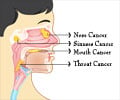Head and neck cancer (HNC) patients who suffered childhood trauma have higher levels of mental health problems such as anxiety and depression that may affect their treatment and prognosis.
- Head and neck cancer patients who underwent childhood trauma are more likely to have mental health issues such as anxiety and depression and continued smoking and alcohol use
- Head and neck cancer is the sixth leading type of cancer worldwide; more than half a million cases are diagnosed each year and nearly half of them die
- Mental health issues of head and neck cancer patients have to be treated to improve overall patient prognosis
TOP INSIGHT
Early life history of cancer patients including traumatic experiences and current mental health state need to be considered during cancer treatment for a better patient outcome.
Early Life Trauma in Head and Neck Cancer Patients
The study was conducted by a team of scientists led by Daniel Bernabé, Ph.D., of São Paulo State University, in Brazil. The aim of the study was- To evaluate the association between childhood traumatic experiences and occurrence of anxiety and depression in head and neck cancer (HNC) patients
Incidence of Mental Health Issues in HNC Patients Who Suffered Childhood Trauma
The key findings of the study included the following
- 95.5 percent (105/110 patients) had experienced some form of childhood trauma. The various types of trauma encountered were as follows
- Emotional neglect (43.8 percent)
- Physical child abuse (30.5 percent)
- Emotional child abuse (15.2 percent)and
- Physical child neglect (8.6 percent)
- Sexual abuse (1.9 percent)
- Emotional neglect (lack of emotional support such as ignoring child's feelings and difficulties and not being there for the child) was associated with an increased incidence of an advanced stage of cancer at diagnosis and higher alcohol consumption
- Childhood physical neglect (lack of necessary physical care such as proper diet so that physical health is affected) was associated with higher anxiety levels
- Patients with increased levels of traumatic events in childhood had an almost 12-times greater chance of having increased depression before starting cancer therapy
Head and Neck Cancer
Head and neck cancer comprises cancers of the mouth, salivary glands, throat, nose, sinuses and lymph nodes in the neck region. Signs and symptoms of head and neck cancer include- A lump or sore that does not go away in any of these locations
- Sore throat that does not respond to antibiotics
- Difficulty in swallowing (dysphagia)
- Persistent cough
- Hoarseness of voice or a recent change in voice
Treatments include a combination of surgery, radiation and chemotherapy. The prognosis in early head and neck cancers is good with treatment. Advanced cancer stage at diagnosis is associated with poor patient outcome.
In summary as per Dr Bernabé’s words, "Assessing traumatic events experienced in childhood may be of great value in understanding neuropsychological mechanisms related to alcohol abuse and anxiety and depression symptoms in patients with cancer. Therefore, the life history of the cancer patient, including their traumatic memories and derived feelings should be considered by the health team during the treatment of cancer patients."
- Head and Neck Cancer - (http://www.who.int/selection_medicines/committees/expert/20/applications/HeadNeck.pdf)
- Head and Neck Cancer - (https://medlineplus.gov/headandneckcancer.html)
Source-Medindia
 MEDINDIA
MEDINDIA





 Email
Email










